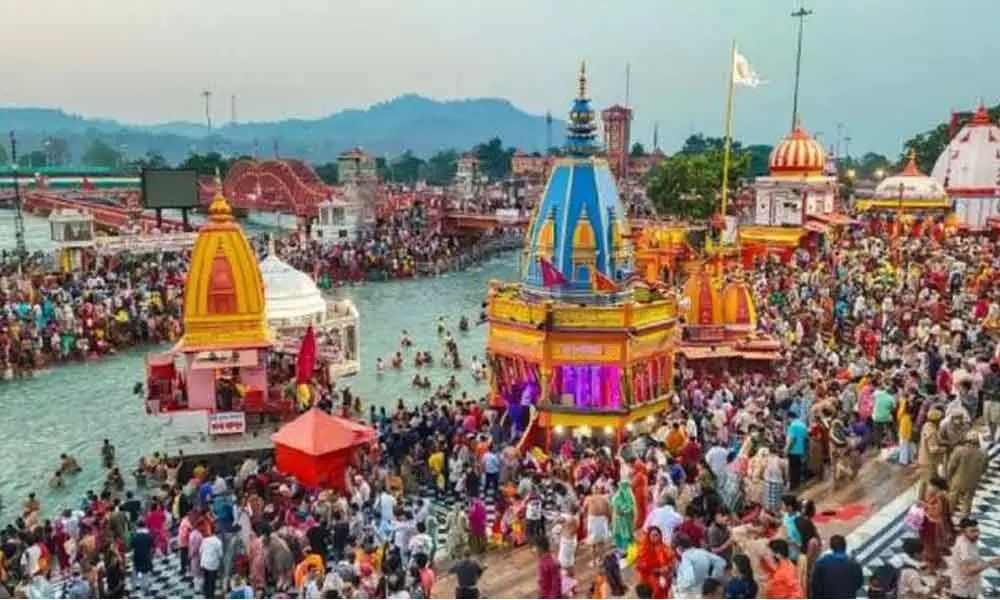Live
- MP BJP to celebrate former PM Vajpayee's birth anniversary on Dec 25
- Christmas Eve 2024: Heartwarming Messages To Share With Your Loved Ones
- PM Modi holds brainstorming session with economists in run-up to Budget
- “Telangana Ready to Support AI Technologies That Drive Social Impact,” says Special Chief Secy, Jayesh Ranjan at Woxsen University’s Future Tech Summit 2024
- Hero Motosports Team Rally Announces Squad For Dakar Rally 2025
- Two Men Found Dead In Parked Caravan In Kerala
- Mandhana moves closer to top spot in ODI, T20I rankings
- IND vs AUS Boxing Day Test 2024: Sam Konstas Debuts, Travis Head’s Fitness in Question
- Congress Challenges Election Rule Amendments In Supreme Court
- Jaishankar’s US Visit: Key Diplomatic Engagement Amid Leadership Transition
Just In
Kumbh devotees get verification calls, even those who did not attend


Kumbh Mela ( File Pic)
Lucknow, July 11: Nearly one lakh devotees who had visited the Kumbh Mela in Haridwar in April-May this year, have started receiving calls to...
Lucknow, July 11: Nearly one lakh devotees who had visited the Kumbh Mela in Haridwar in April-May this year, have started receiving calls to ascertain if the person using the number had even attended the Kumbh Mela in the first place.
A large number of devotees from Uttar Pradesh had attended the Haridwar Kumbh Mela.
Rudra Dutt Chaturvedi, an octogenarian in Kanpur, has received one such call.
"I did not visit the Kumbh Mela but my relatives did. I received a call asking details about my visit. I do not know if my relatives gave my number but then why would they give my number?" he wondered.
Teams investigating the RT-PCR test scam that surfaced during the Kumbh Mela are now calling up all mobile phone numbers that were registered against the nearly 1 lakh RT-PCR tests that are alleged to be fake.
The Uttarakhand government has constituted an eight-member team that is dialing these numbers, one by one, and verifying them.
Eleven private companies had bene authorized by the Uttarakhand government to carry out RT-PCR tests of people attending the fair. This was done in order to detect Covid-19 cases and prevent the viral infection from spreading in the Kumbh Mela area.
Among these 11 companies was Max Corporate Services, which in turn hired Nalwa Labs and Dr Lalchandani Labs to conduct RT-PCR tests. Nearly 1 lakh carried out by these labs are under the scanner.
Interestingly, the Nalwa Labs further outsourced the work to a company called Dolifia, even though it did not have a licence to conduct RT-PCR tests.
Investigations, so far, have revealed that these 1 lakh RT-PCR tests were done merely on papers and no test was actually carried out. As a result, the Kumbh Mela, apparently, turned into a super spreader and Covid cases rose dramatically.
Haridwar district magistrate, C. Ravishankar, said that the labs conducting RT-PCR tests were supposed to mandatorily record details of each person whose samples were being collected.
However, despite this, the private labs flouted norms and resorted to illegal means to showcase an inflated number of tests conducted by them.
The district magistrate has also constituted a three-member team to investigate the matter and the probe is on.
The Haridwar Kumbh RT-PCR test scam came to light when one Vipin Mittal, a resident of Faridkot (in Punjab), wrote to the Uttarakhand health secretary stating that even though he did not attend the Kumbh Mela, an RT-PCR report from Haridwar was delivered to him.
Following this, the health secretary ordered the Haridwar district magistrate to investigate this matter and during initial investigations, it was found that one lakh fake RT-PCR tests had been shown on paper.
Following the findings of the preliminary investigation, which indicated fraud by the private labs, the district magistrate ordered a case to be registered against them.
Acting on the complaint of Haridwar's Chief Medical Officer Dr S.K. Jha, the police filed a case on June 17 in which three private firms have been named as accused.
Based on the findings, the labs have been booked under sections 269 (negligent act likely to spread infection of disease dangerous to life), 420 (cheating and dishonesty), 468 (forgery for purpose of cheating), 471 (using as genuine a forged document), 120 B (criminal conspiracy) and 188 (disobedience to order duly promulgated by public servant) of the Indian Penal Code, along with sections of the Disaster Management Act and the Epidemic Act.
According to investigations, between April 13 and May 16, these companies provided entries of 1,04,796 samples. Of these, details of 95,102 samples were uploaded on the online portal.
It has been alleged that in order to maximize their profits, these companies prepared fake test reports.
For example, these companies claimed to have collected 3,925 samples in Haridwar's Nepali Farm area. However, all these samples were registered against the same mobile phone number.
Meanwhile, Max Corporate Services and Dr Lalchandani Labs have approached the Uttarakhand High Court and challenged the FIR filed against them.

© 2024 Hyderabad Media House Limited/The Hans India. All rights reserved. Powered by hocalwire.com






